Ethical Hypnotherapy Guidelines
What Are the Key Confidentiality Considerations in Hypnotherapy?
September 5, 2015 - Ethical Hypnotherapy Guidelines
Confidentiality considerations in hypnotherapy are crucial for building trust and upholding ethical standards. Adherence to legal frameworks, obtaining informed consent, and maintaining accurate record-keeping practices ensure client confidentiality. Effective communication with other professionals while safeguarding client anonymity is essential. Supervision and consultation support ethical decision-making, and robust data security measures protect sensitive information. These key aspects create a safe and secure environment for clients to explore their healing journey.
Legal Frameworks

One crucial aspect in the practice of hypnotherapy is understanding the legal frameworks that govern client confidentiality and privacy. Ethical standards and professional boundaries play a fundamental role in safeguarding the sensitive information shared between the hypnotherapist and the client.
Hypnotherapy, like other forms of therapy, operates under strict guidelines to ensure that client confidentiality is maintained at all times.
Ethical standards dictate that hypnotherapists must keep all information disclosed by clients during sessions confidential unless there is a legal obligation to disclose such information. Professional boundaries are established to delineate the limits of the therapeutic relationship and prevent any potential harm or exploitation.
Adherence to legal frameworks not only ensures the protection of the client's privacy but also fosters trust and a safe environment for the therapeutic process to unfold. By upholding ethical standards and respecting professional boundaries, hypnotherapists can create a secure space where clients feel comfortable sharing their thoughts, emotions, and experiences without fear of judgment or breach of confidentiality.
Informed Consent
Understanding the concept of informed consent is paramount in the practice of hypnotherapy as it establishes the foundation for a collaborative and ethically sound therapeutic relationship. Informed consent involves providing clients with clear information about the therapy process, including potential risks and benefits, allowing them to make autonomous decisions regarding their treatment. This process respects client autonomy, recognizing their right to choose whether to engage in therapy and the specific interventions offered.
In hypnotherapy, informed consent goes beyond a mere formality; it serves as a cornerstone for building trust and transparency between the therapist and the client. By fostering open communication and mutual understanding, informed consent lays the groundwork for a therapeutic relationship characterized by respect, empathy, and shared decision-making. This collaborative approach not only enhances the effectiveness of the therapy but also ensures that clients feel empowered and actively involved in their healing journey.
Ultimately, prioritizing informed consent in hypnotherapy safeguards the welfare and autonomy of clients while promoting a positive and ethical therapeutic environment.
Record-Keeping Practices

Establishing and maintaining meticulous record-keeping practices is a fundamental aspect of upholding ethical standards and ensuring accountability in the field of hypnotherapy. Hypnotherapists have ethical obligations to maintain accurate and confidential client records. These records should include detailed information about the client's personal history, presenting issues, treatment plans, progress notes, and any other relevant details from each session.
Privacy protection is paramount when it comes to record-keeping in hypnotherapy. It is essential to store client records securely, ensuring that only authorized personnel have access to them. This helps safeguard sensitive information and maintain client confidentiality.
Hypnotherapists must follow legal requirements and professional guidelines regarding the retention and disposal of client records to prevent unauthorized access or breaches of privacy.
Communication With Other Professionals
Effective communication with other healthcare professionals is essential for holistic and collaborative care in the field of hypnotherapy. Collaborative relationships with physicians, psychologists, and other practitioners can enhance the overall well-being of clients by providing a comprehensive approach to treatment. When sharing information with other professionals, it is crucial to maintain ethical boundaries to uphold client confidentiality.
Establishing clear communication channels and protocols for sharing information is vital to ensure that all parties involved are informed and working towards the common goal of supporting the client. It is important to only disclose information that is necessary for the client's care and to obtain consent from the client before sharing any sensitive details with other professionals.
Client Anonymity

Maintaining client anonymity is a fundamental principle in ensuring the confidentiality and privacy of individuals seeking hypnotherapy services. Ethical considerations dictate that hypnotherapists must establish clear boundaries to protect the identity and personal information of their clients. Upholding client anonymity involves safeguarding all confidential communications, session records, and any identifying details shared during therapy sessions.
Ethical guidelines emphasize the importance of informed consent, where clients are made aware of how their information will be handled and the limits of confidentiality within the therapeutic relationship. Hypnotherapists are bound to respect the privacy rights of their clients, refraining from disclosing any information without explicit permission unless required by law.
Maintaining client anonymity not only fosters trust between the therapist and client but also upholds the ethical standards of the profession. By setting clear boundaries regarding the confidentiality of client information, hypnotherapists create a safe and secure environment where individuals can explore their thoughts, emotions, and behaviors without fear of judgment or unauthorized disclosure.
Supervision and Consultation
What role does supervision and consultation play in ensuring the quality and ethical practice of hypnotherapy?
Supervision and consultation are essential components in maintaining ethical boundaries and promoting professional development within the field of hypnotherapy.
Supervision involves a qualified and experienced hypnotherapist overseeing the work of another hypnotherapist to ensure that ethical standards are upheld, client welfare is prioritized, and professional growth is nurtured. It provides a structured opportunity for the hypnotherapist to reflect on their practice, discuss challenging cases, and receive guidance on ethical dilemmas.
Consultation, on the other hand, involves seeking advice or input from colleagues, mentors, or experts in the field to enhance one's skills, knowledge, and ethical decision-making. It offers a platform for exchanging ideas, gaining different perspectives, and staying updated on best practices in hypnotherapy.
Data Security Measures

Implementing robust data security measures is paramount in ensuring the confidentiality and integrity of client information in the practice of hypnotherapy. Security protocols play a vital role in safeguarding sensitive data from unauthorized access or breaches.
Hypnotherapists should establish strict security protocols within their practice, such as limiting access to client records to authorized personnel only. Encryption methods are also essential in protecting data both at rest and in transit. Utilizing encryption techniques ensures that client information remains secure and confidential, even if intercepted by malicious actors.
Furthermore, regular security audits and updates to security measures are crucial to adapt to evolving cyber threats and vulnerabilities. Hypnotherapists must stay informed about the latest advancements in data security and continuously enhance their security infrastructure to maintain the trust and confidentiality of their clients.
Frequently Asked Questions
How Can Hypnotherapists Ensure Client Confidentiality During Group Sessions?
Maintaining client confidentiality during group hypnotherapy sessions involves navigating privacy concerns within dynamic group settings. Confidentiality challenges may arise, especially in virtual therapy formats, where ensuring individual privacy amidst group dynamics is crucial for ethical practice.
Are There Any Specific Guidelines for Handling Client Confidentiality in Online Hypnotherapy Sessions?
In online hypnotherapy sessions, it is crucial to implement technology safeguards such as encryption. Establishing clear boundaries through consent forms is essential to ensure client confidentiality. Adhering to specific guidelines can help maintain privacy and trust.
What Steps Should Be Taken to Maintain Confidentiality When Working With High-Profile Clients?
When working with high-profile clients, ensuring confidentiality is paramount. Steps to maintain secrecy include implementing strict protocols, limiting access to information, and educating staff on privacy measures. Public relations and media exposure necessitate heightened vigilance in safeguarding client confidentiality.
How Can Hypnotherapists Address Confidentiality Concerns When Treating Minors?
When treating minors in hypnotherapy, hypnotherapists must navigate parental involvement to uphold ethical boundaries. Maintaining confidentiality while engaging parents in the therapeutic process is crucial for ensuring the well-being of the minor client.
What Measures Are in Place to Protect Client Confidentiality in Case of Hypnotherapist Incapacitation?
Privacy policies are fundamental in safeguarding client information in the event of hypnotherapist incapacitation. Establishing emergency protocols, backup therapists, and legal safeguards ensures continuity of care and confidentiality. These measures uphold ethical standards and protect client trust.
Conclusion
In conclusion, maintaining confidentiality in hypnotherapy is paramount to ensure trust and privacy for clients. Adhering to legal frameworks, obtaining informed consent, implementing secure record-keeping practices, communicating effectively with other professionals, protecting client anonymity, seeking supervision and consultation, and utilizing data security measures are essential considerations in upholding confidentiality in hypnotherapy practice.
By prioritizing these key factors, hypnotherapists can uphold ethical standards and promote a safe and confidential therapeutic environment for clients.
